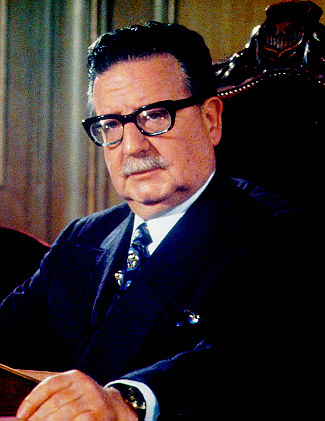
Salvador Allende Gossens was elected President of Chile in 1970. Allende was the first Marxist ever elected in free elections. He immediately established diplomatic relations with Cuba and China, and nationalized a number of U.S.- owned companies. .
Salvador Allende Gossens was elected President of Chile in 1970. He was the first Marxist to be elected president in a free election. His election was the culmination of years of political struggle and the growing influence of leftist ideology in Latin America. Allende's presidency was characterized by ambitious reforms, bold international alliances, and intense domestic and international opposition, which ultimately led to a dramatic and tragic end.
Upon taking office, Allende immediately set about transforming Chile's economic and social landscape. One of his first actions was to establish diplomatic relations with Cuba and China, signaling a clear shift in Chile's foreign policy. This move was part of Allende's broader strategy to align Chile more closely with other socialist and communist states, thereby reducing its dependence on the United States and other Western powers. The establishment of these diplomatic ties was not merely symbolic; it also facilitated economic and technical cooperation that Allende hoped would aid in the development of Chile's economy.
Domestically, Allende embarked on a sweeping program of nationalization and social reform. One of the most controversial aspects of his economic policy was the nationalization of several key industries, many of which were owned by U.S. companies. This included the copper industry, which was Chile's most important export sector. The nationalization of copper was seen by Allende and his supporters as a necessary step to regain control over the country's natural resources and to ensure that the profits from these industries were used to benefit the Chilean people rather than foreign corporations. However, this move angered the U.S. government and business interests, leading to economic and diplomatic repercussions.
Allende's government also implemented a wide range of social reforms aimed at improving the living standards of Chile's poorest citizens. These included initiatives to increase wages, provide free milk for children, and expand access to education and healthcare. Land reform was another critical component of Allende's agenda. He sought to redistribute land to peasant farmers in an effort to break up the large estates that had dominated Chilean agriculture for centuries. While these reforms were popular among the working class and rural poor, they also generated significant opposition from the landowning elite and the middle class, who saw their interests threatened by Allende's policies.
The nationalization of industries and the redistribution of land were central to Allende's vision of a socialist Chile, but they also led to increasing economic difficulties. Inflation soared, and shortages of basic goods became widespread. The economic turmoil was exacerbated by a campaign of economic sabotage and destabilization orchestrated by domestic opponents and supported by the United States. The CIA, under directives from President Nixon, funneled funds to opposition groups and orchestrated strikes and protests to undermine Allende's government.
As the economic and political situation in Chile deteriorated, the country became increasingly polarized. Allende's supporters, who were primarily from the working class and peasantry, remained fiercely loyal, while the middle and upper classes, as well as significant portions of the military, became more vehement in their opposition. The political climate grew increasingly tense, with frequent strikes, protests, and violent clashes between supporters and opponents of the government.
Salvador Allende's presidency remains a deeply controversial and debated period in Chilean history. To his supporters, he is remembered as a martyr for socialism and a champion of the poor and oppressed. To his detractors, his government is seen as a period of economic mismanagement and political chaos.
 >
>